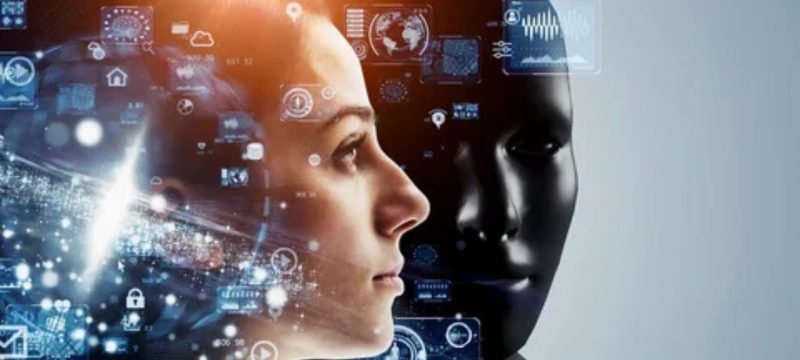In today’s fast-paced world, Artificial Intelligence (AI) isn’t just powering machines. It’s quietly transforming the way human beings live, work, and connect. From voice assistants that simplify your daily routine to health apps that monitor your well-being, AI is no longer science fiction. However, it’s a personal companion. But what does “AI for human being” really mean?
What Does “AI for Human Being” Really Mean?
In all the tech buzzwords and futuristic headlines, the phrase “AI for human being” stands out with a deeper, more human-centered meaning. It’s not just about robots performing tasks or algorithms predicting trends. However, it’s about how Artificial Intelligence can serve, support, and empower people in their daily lives.
At its core, this concept focuses on creating AI systems that prioritize human needs, respect our values, and enhance our well-being, rather than replace them. Whether it’s through simplifying household chores, improving mental health care, or making education more accessible, AI is increasingly designed with the human experience at its center.
This shift towards “human-first AI” means developers and companies are now asking critical questions:
- Will this AI improve someone’s life?
- Is it ethical and inclusive?
- Does it support emotional and physical well-being?
In short, “AI for human being” is not about replacing humans. It’s about redefining support in a way that helps us thrive in an AI-powered world.
How AI is Improving Our Daily Lives
Artificial Intelligence is no longer limited to labs or tech companies. AI for human being now quietly woven into the very fabric of our daily routines. It often happens in ways we don’t even notice. From health apps to smart homes and education platforms, AI is becoming a trusted companion, silently working behind the scenes to simplify, optimize, and enhance the human experience.
Smart Health Monitoring at Your Fingertips
Gone are the days when regular health checkups meant long waits and hospital visits. With AI-powered fitness watches and mobile apps, you can now track your heart rate, sleep cycles, and stress levels in real-time. These systems not only collect data but also offer intelligent insights to help you make better lifestyle choices. Some apps even detect early signs of health issues and recommend action before problems worsen. It gives you more control over your well-being than ever before.
Better Learning Through Personalized Education
Every student learns differently, and AI understands that. Modern learning platforms now use artificial intelligence to adapt lessons based on a student’s pace, strengths, and weaknesses. If a learner struggles with a math concept, AI steps in with targeted practice questions. If another excels in writing, it pushes them to the next level. The result? A more meaningful, personalized education that supports growth and builds confidence whether at home, in classrooms, or through self-study.
Smarter Homes That Understand Your Needs
From turning on the lights when you walk in, to adjusting the temperature before you say a word. Smart home devices powered by AI for human being are making daily living more comfortable and energy-efficient. These systems learn your preferences over time. They know when you like your coffee, what music you prefer in the evening, and even when to alert you about forgotten chores. AI transforms homes from passive shelters into intelligent spaces that work for you.
Emotional Support and Mental Wellness
Mental health has become a growing concern, and AI is stepping in with innovative solutions. Chatbots and AI companions are helping individuals talk through their stress, loneliness, or anxiety, especially when human support isn’t readily available. These systems are not replacements for therapists, but they offer a safe space to share thoughts, access coping strategies, and stay emotionally connected. For many, AI becomes a non-judgmental friend who’s always ready to listen.
Making Everyday Decisions Easier
Whether you’re shopping online, managing your schedule, or choosing your next movie, AI for human being is simplifying choices with personalized recommendations. It learns from your behavior and preferences, showing you what’s relevant and helping save time. From virtual assistants that set reminders to AI tools that organize your workday, decision-making becomes less overwhelming. It you more time to focus on what truly matters.
Ethical Considerations & Challenges
As Artificial Intelligence becomes more integrated into our daily lives, it’s important to pause and reflect on the ethical challenges that come with it. While AI promises convenience and empowerment, it also raises questions that directly affect human rights, trust, and long-term well-being.
One of the most critical concerns is the dependency on AI. As people rely more on smart systems for decision-making, communication, and even emotional support, there’s a growing risk of losing essential human skills, such as deep thinking, empathy, and problem-solving. The line between assistance and overreliance is thin and easily crossed.
Another major challenge is data privacy. AI systems thrive on data, including your searches, habits, and preferences. But how that data is collected, stored, and used isn’t always transparent. In many cases, users have little control or understanding of where their personal information is going. This creates an imbalance of power between tech creators and everyday users, potentially compromising their privacy and autonomy.
Closely tied to privacy is the issue of bias in AI algorithms. If the data used to train AI systems reflects societal biases like racism, gender inequality, or economic disparity, then the AI can unknowingly amplify those same issues. This can lead to unfair hiring practices, biased medical decisions, or even discrimination in financial services.
Then there’s the problem of black-box decision-making. Many AI models are so complex that even their developers can’t fully explain how they reach certain conclusions. This lack of transparency can be particularly dangerous, especially in high-stakes areas such as criminal justice, healthcare, or finance. Without clear explanations, users are left to trust systems they don’t understand.
As noted by experts at iCert Global, the key lies in designing AI systems that are not only intelligent but also human-centered and transparent. The goal is to develop technology that works in conjunction with humans, not in place of them. Similarly, platforms like Business Insider and Time.com have emphasized the growing need for ethical governance, where AI is held accountable through laws, guidelines, and regular audits.
Real-Life Examples of AI for Human Being
Artificial Intelligence isn’t just a futuristic idea; it’s already transforming lives around the world in meaningful, measurable ways. From healthcare to emotional support, here are some real-world examples that show how AI for human being is not only possible, but powerful.
ElliQ: A Robot That Fights Loneliness
One of the most heartwarming applications of AI is ElliQ, an AI-powered companion designed to support older adults living alone. This friendly tabletop robot holds conversations, reminds users to take their medications, encourages physical activity, and even plays music or jokes to lift their mood. ElliQ is not just a device for many seniors; it becomes a comforting presence that helps combat isolation and mental decline.
Voice AI in Healthcare: Reducing Stress for Clinicians
Hospitals worldwide are now utilizing voice-based AI systems to alleviate the administrative burdens on doctors and nurses. These tools can transcribe notes, manage schedules, and handle routine queries, allowing medical professionals to focus more time on patient care. According to reports from Business Insider, this shift not only improves productivity but also enhances emotional wellness for overworked healthcare workers.
Replika: Emotional Support in Your Pocket
Replika is a popular AI chatbot app designed to offer emotional support and non-judgmental conversation. Especially helpful for those struggling with anxiety or loneliness, Replika learns your communication style and adapts to your emotional state. It’s not a substitute for therapy, but for many users, it’s a safe space to talk, reflect, and feel heard any time of day.
Specialized Learning Apps: Tailoring Education with AI
AI-driven platforms, such as Khan Academy and Socratic by Google, are reshaping how students learn. These tools don’t just offer information; they personalize the learning journey. For example, a student struggling in math can receive step-by-step guidance tailored to their mistakes, while a fast learner can move ahead at their own pace. The result of AI for human being is not just better grades, but increased confidence and engagement.
AI for Accessibility: Giving Everyone a Voice
For individuals with disabilities, AI presents new opportunities for interaction with the world. Text-to-speech apps, real-time transcription tools, and visual recognition systems enable users to navigate their surroundings, communicate effectively, and achieve greater independence. Apps like Seeing AI by Microsoft can describe objects, people, and even emotions, empowering people with visual impairments to experience life more fully.
How to Use AI Mindfully in Your Daily Life
While Artificial Intelligence offers powerful benefits, using it mindfully ensures that we stay in control and truly benefit from its potential, without becoming overly dependent or compromising our values. The key is to use AI as a tool for empowerment, not a replacement for human connection, creativity, or critical thinking.
Choose AI Tools That Align With Your Needs
Not every AI solution is right for everyone. Before adopting a new AI app or device, ask yourself: Does this tool genuinely make my life easier or better? Whether it’s a health tracker, productivity assistant, or chatbot, choose tools that add value to your lifestyle, not ones that add clutter or confusion.
Stay Aware of Your Data and Privacy Settings
Most AI-powered apps rely on your personal data to function. That’s why it’s important to review what permissions you’re giving and understand how your data is being used. Always opt for platforms that are transparent about data practices and give you control over your information.
Balance AI Convenience with Human Interaction
It might be tempting to let AI handle everything from reminders to conversations but nothing replaces real human connection. Use AI for human being to support your routine, but don’t let it replace relationships or reduce opportunities for personal growth. Let it enhance your time, not control it.
Question, Learn, and Stay Informed
The AI landscape is constantly evolving. Make it a habit to stay informed about the tools you use, new updates, and ethical debates around AI. The more you understand how AI works, the better you’ll be at using it wisely. Treat it as a learning partner, not a mysterious black box.
Set Boundaries for Screen Time and Digital Dependency
Smart assistants and AI apps can save time but only if we’re intentional about how much we use them. Set digital boundaries. Take regular breaks from screens. And don’t forget to reconnect with nature, people, and non-digital hobbies that bring joy and balance to your life.







